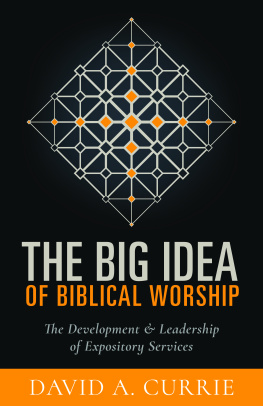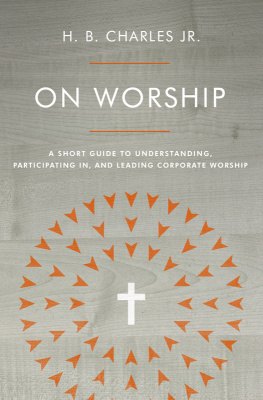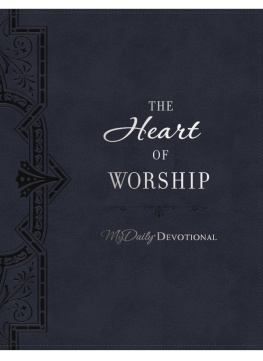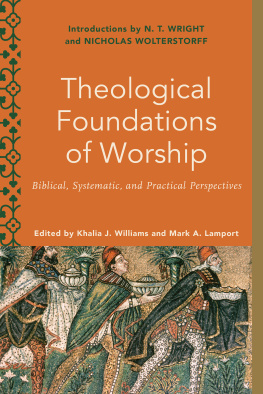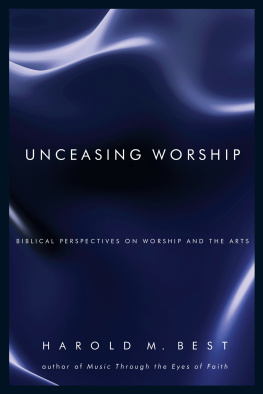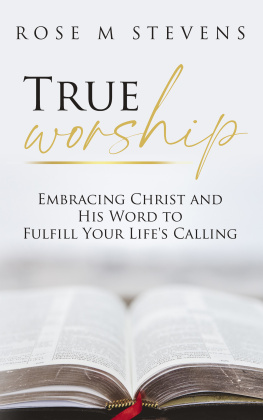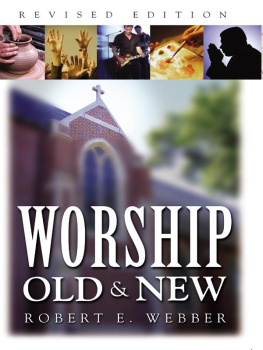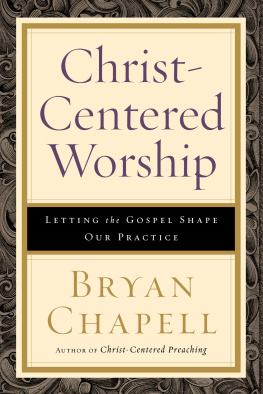Acknowledgments
Just as You never walk aloneand, as Ill make a case for later on, You never worship aloneso too you never write a book alone. Even though my name is the only one on the cover, many others over many years have helped me develop my approach to biblical worship and put it into print.
As the title suggests, this book on worship is dependent upon the seminal work of Haddon Robinson, Biblical Preaching: The Development and Delivery of Expository Messages. When I first discovered this book as a new preacher, I remember my profound gratitude that someone had laid out a clear process for what I was floundering around trying to figure out on my own. My gratitude grew as Haddon moved from author to associate later on in my life as we came to share leadership of the Doctor of Ministry Program at Gordon-Conwell Theological Seminary, and he encouraged me personally and professionally to apply his preaching approach to worship.
Haddons colleagues in Gordon-Conwells Preaching DepartmentScott Gibson, Jeff Arthurs, and Matt Kimhave patiently guided me further along in my understanding and appreciation of the nuances of the Big Idea method. They each have also played key roles in the Evangelical Homiletics Society, which provided me with opportunities to try out the ideas that now form some of the sections of this book (on the lectionary and on lectio divina) through papers I presented at annual conferences.
While we taught the Pastor as Preacher residency of the Pastoral Theology in Practice DMin track together, Scott heard me teach more of the material in this book, and he began regularly and insistently encouraging me to translate it from oral to written form. If I had listened to him more responsively, this book would have appeared years earlier. Our co-mentor for this track, Ken Swetland, added his voice to the chorus of encouragement, highlighting what many of our students shared with me: I cant find this stuff any place else. When are you going to write this up as a book?
The Biblical Worship DMin track that I developed and taught with my colleague Gary Parrett compelled me to think through what I had been doing as a pastor in far greater depth. Garys consistently thorough and thoughtful feedback shaped my approach as we taught together, and his ongoing prayers since then have shaped this work for the better. The amazing students in the two cohorts who completed this track also refined my thinking and encouraged me to pursue publication. They field-tested this approach in a wide variety of contextsfrom Singapore to India to Taiwan to Springfield, Missouri; and in Pentecostal, Congregational, Anglican, Baptist, and Korean Presbyterian churchesconfirming its flexibility and applicability far beyond how it originated in my own ministry. I am delighted that one of the graduates of this track, Randal Quackenbush, and Gordon-Conwells new professor of worship, Emmett Price, will be taking over the track from Gary and me.
Three pastorsChris Edwards, Doug Forsberg, and Chris Ziegler, who still welcome me as one of their own despite a decade primarily in academicshave not only cared for my soul twice a year on our prayer retreats, but they also prayed this book into reality when I was tempted to keep postponing it or even to give up. They also read the manuscript with pastoral eyes to make sure that what Ive written reflects the realities of congregational life.
Julie Tennent provided musicians eyes to reflect that perspective as well. My lame humor remains despite her wise counsel. However, I did catch her passion for reviving the use of the Psalter, which embodies the approach to biblical worship in this book.
The congregation I was privileged to serve as founding pastor for over a decade, the Anchor Presbyterian Church, provided a laboratory for me to experiment with the process presented in this book. My parishioners and coworkers exhibited great forbearance through much error and trial, surrounding me with love and prayer. Their openness and eagerness to let the Scriptures shape our worship, which in turn shaped our lives, reflected our vision to seek the fullness of Christ for the fulfillment of Christs kingdom everywhere in the world and in every area of life. Most of the examples in this book are drawn from my ministry at The Anchor.
A grant from the Kern Family Foundation allowed me to get away on my first sabbatical to begin writing during several weeks at Wycliffe Hall in Oxford, where Vice Principal Simon Vibert extended exceptional hospitality. The faculty and trustees of Gordon-Conwell also approved several additional writing weeks to enable me to finish the book, and the seminary president, Dennis Hollinger, and vice president for academic affairs, Rick Lintsmy bossesstrongly encouraged me to take this time away to write, despite the press of urgent administrative tasks. Bridget Erickson, who provides operational oversight of the DMin Program and the Ockenga Institute, not only freed me up to be away multiple times, but she also volunteered to read the manuscript and provide unfiltered Vermont feedback from a laypersons perspective. Bill and Lane Anderson opened up Birdsong Lodge, their getaway in the Smoky Mountains, for one of these writing weeks, and my mother, Elinor Currie, let me take over her dining room table in Florida for another one.
Sean McDonough expressed initial interest in having Hendrickson publish this book, connecting me to my editors Patricia Anders, Maggie Swofford, and Carl Nellis, who have worked patiently to help this new author see this work through the editorial and publication process. Randall Rhodes, my graduate assistant, compiled the index, an act of service not only to me but also to readers who want to find something in particular.
Most of those mentioned above have read all or part of this book in manuscript form, greatly improving itwith my resistance to changing some parts preventing it from being perfected. One person has not only read this book but lived it with me for almost four decades: my wife, Susan. Together we have sought to live out Psalm 119:54: Your decrees are the theme of my song wherever I lodge.

